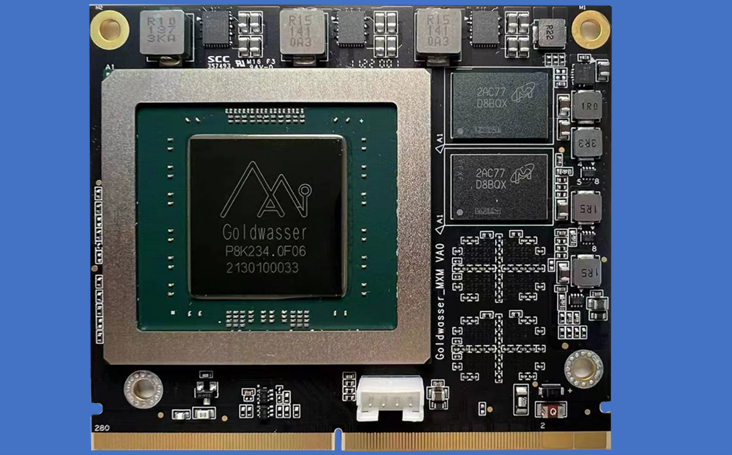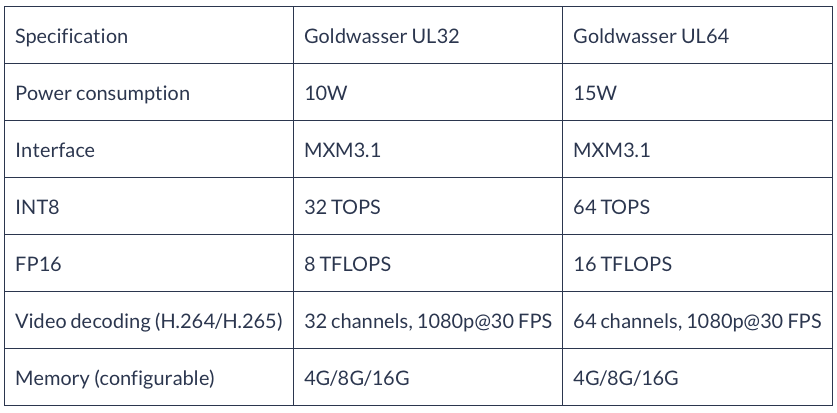Chinese Govt. Funds CUDA-Compatible GPU Startup to Compete Against Nvidia
Startup plans to use Nvidia's greatest advantage against it.

Denglin Technology, a Shanghai-based compute GPU developer established in 2017, recently secured funding from the China Internet Investment Fund, a venture initiated by the State Cyberspace Administration of China and the Ministry of Finance. The GPU in question is claimed to feature a "computing architecture compatible with programming models like CUDA/OpenCL," positioning them well to compete against Nvidia, but while potentially using Nvidia's greatest competitive advantage — CUDA — against it.
The investment capital will advance the research and development of Denglin's full-range products, accelerating mass production and commercialization of their next-gen Goldwasser GPUs, reports Jon Peddie Research.
Denglin's product line, including its flagship Goldwasser, is designed primarily for artificial intelligence applications. Previously, the company said the GPU could also be used for gaming. The company asserts that Goldwasser is the first enterprise Chinese GPU to execute large-scale commercial applications successfully.
One of the features of the Goldwasser GPU is Denglin's GPU+ architecture that enables software-defined on-chip heterogeneous computing technology, according to JPR. The most intriguing part is that Goldwasserclaims to be directly compatible with programming models like Nvidia's CUDA, the report says. (More claims of direct CUDA compatibility here.) Hence, financing from the government could leverage rival Nvidia's CUDA frameworks for compute. Of course, it remains to be seen whether Denglin will build silicon that's competitive enough to end Nvidia's dominance in the AI GPU market, but it certainly has such ambitions.
The founders of Denglin Technology, Li Jianwen and Wang Ping, are alumni of Tsinghua University, and their Vice President of Global Operations, Yang Jian, previously served in a similar capacity in Huawei's global supply chain. Denglin, with its wide-ranging experience in GPU R&D and commercialization, operates seven R&D centers in various cities, including Silicon Valley, Chengdu, and Hangzhou. The company is among 13 GPU developers in China, JPR claims.
The global GPU market was worth $33.47 billion in 2021 and is predicted to reach $477.37 billion by 2030, marking a compound annual growth rate of 34.4% from 2021 to 2030, according to data from Verified Market Research (in India) cited by JPR. This rise is primarily propelled by growing demand from professional software users, gamers, and esports fans. Meanwhile, AI is already becoming a significant contributor to this market.
Goldwasser is yet another entrant in the packed Chinese GPU startup scene, with others like Biren making a splash in recent months. However, with supposed CUDA compatibility and fresh funding from the Chinese government, this new company appears primed to make a more immediate impact.
Get Tom's Hardware's best news and in-depth reviews, straight to your inbox.

Anton Shilov is a contributing writer at Tom’s Hardware. Over the past couple of decades, he has covered everything from CPUs and GPUs to supercomputers and from modern process technologies and latest fab tools to high-tech industry trends.
-
Li Ken-un Whoever it is doesn’t matter. Just end Nvidia’s dominance. I still have a workstation GPU that can only be used on bare metal (no virtualization) because they want thousands of dollars more for a subscription.Reply -
bit_user I wonder if they'll use AMD's open source HIP to implement their CUDA compatibility layer.Reply -
samopa The GPU in question is claimed to feature a "computing architecture compatible with programming models like CUDA/OpenCL,"Reply
Sorry, but I'm bit lost here ... Isn't CUDA is NVidia owned IP ? Can someone make a compatible CUDA thing without NVidia permission ? -
bit_user Reply
AMD's HIP is a CUDA clone, but they use different names to avoid copyright or trademark infringement. If they weren't concerned about either of those things, then they could've made their GPUs API-compatible with CUDA.samopa said:The GPU in question is claimed to feature a "computing architecture compatible with programming models like CUDA/OpenCL,"
Sorry, but I'm bit lost here ... Isn't CUDA is NVidia owned IP ? Can someone make a compatible CUDA thing without NVidia permission ?
As for "CUDA/OpenCL", that's sort of a giveaway that they're probably not trying to build GPUs that are binary-compatible with NVidia's, but rather just generically similar GPUs in the same sense as Intel and AMD do. -
renz496 Reply
they will end nvidia dominance in China at best.Li Ken-un said:Whoever it is doesn’t matter. Just end Nvidia’s dominance. I still have a workstation GPU that can only be used on bare metal (no virtualization) because they want thousands of dollars more for a subscription.
yes. nvidia allowed that to happen. many hardware maker actually make their hardware to be compatible with nvidia CUDA like Qualcomm.samopa said:The GPU in question is claimed to feature a "computing architecture compatible with programming models like CUDA/OpenCL,"
Sorry, but I'm bit lost here ... Isn't CUDA is NVidia owned IP ? Can someone make a compatible CUDA thing without NVidia permission ? -
bit_user Reply
Source?renz496 said:many hardware maker actually make their hardware to be compatible with nvidia CUDA like Qualcomm.
A quick web search isn't supporting the claim that Adreno is CUDA-compatible. I've never heard of another vendor's GPUs offering CUDA compatibility. -
renz496 Reply
it is something that i found out long time ago. i tried looking into it but can't find it. back then i was surprise about it as well. though i'm not sure if it was snapdragon or other type of chip from qualcomm.bit_user said:Source?
A quick web search isn't supporting the claim that Adreno is CUDA-compatible. I've never heard of another vendor's GPUs offering CUDA compatibility. -
bit_user Reply
Okay, then it's not a thing. If it were true, it would be a big deal. CUDA is a big and evolving SDK. Active and continual CUDA support would be a resource-intensive activity and a company wouldn't underwrite the costs of doing it without making a big deal about it.renz496 said:it is something that i found out long time ago. i tried looking into it but can't find it.
Furthermore, with 90%+ of Qualcomm's market being Android phones and Chomebooks, it wouldn't make sense for them to do. Google does not allow Android phones to ship with support for unsanctioned APIs, like CUDA.
I believe you were misinformed.
